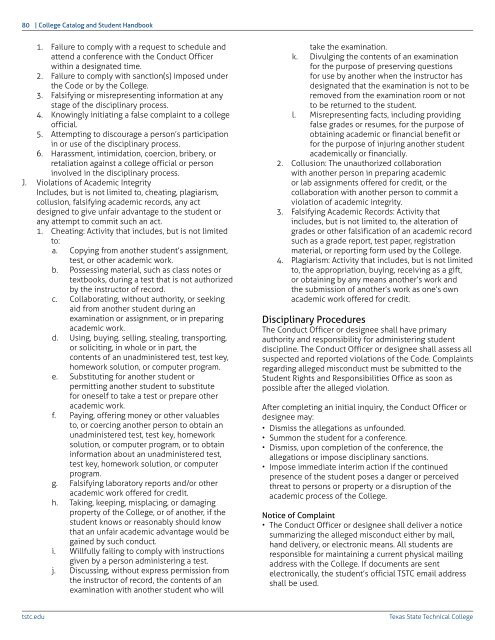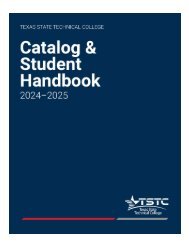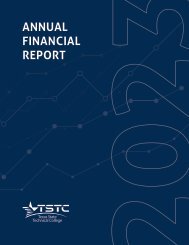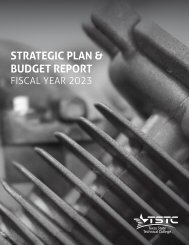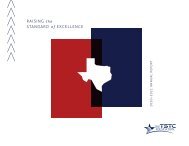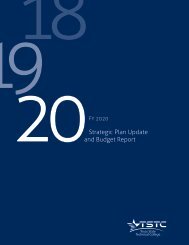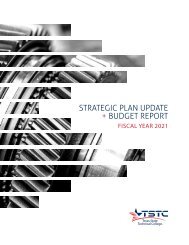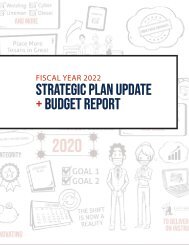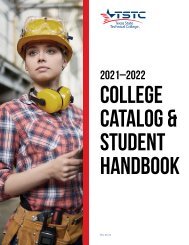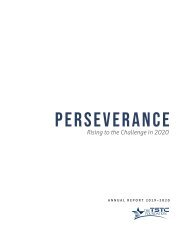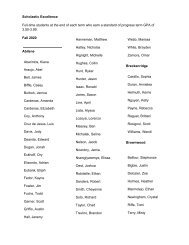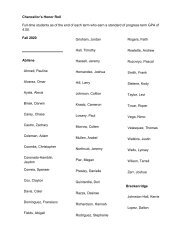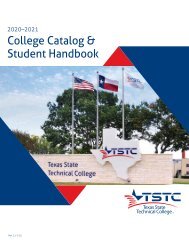Student Handbook and Catalog 2021-22 V2
Create successful ePaper yourself
Turn your PDF publications into a flip-book with our unique Google optimized e-Paper software.
80 | College <strong>Catalog</strong> <strong>and</strong> <strong>Student</strong> <strong>H<strong>and</strong>book</strong><br />
1. Failure to comply with a request to schedule <strong>and</strong><br />
attend a conference with the Conduct Officer<br />
within a designated time.<br />
2. Failure to comply with sanction(s) imposed under<br />
the Code or by the College.<br />
3. Falsifying or misrepresenting information at any<br />
stage of the disciplinary process.<br />
4. Knowingly initiating a false complaint to a college<br />
official.<br />
5. Attempting to discourage a person’s participation<br />
in or use of the disciplinary process.<br />
6. Harassment, intimidation, coercion, bribery, or<br />
retaliation against a college official or person<br />
involved in the disciplinary process.<br />
J. Violations of Academic Integrity<br />
Includes, but is not limited to, cheating, plagiarism,<br />
collusion, falsifying academic records, any act<br />
designed to give unfair advantage to the student or<br />
any attempt to commit such an act.<br />
1. Cheating: Activity that includes, but is not limited<br />
to:<br />
a. Copying from another student’s assignment,<br />
test, or other academic work.<br />
b. Possessing material, such as class notes or<br />
textbooks, during a test that is not authorized<br />
by the instructor of record.<br />
c. Collaborating, without authority, or seeking<br />
aid from another student during an<br />
examination or assignment, or in preparing<br />
academic work.<br />
d. Using, buying, selling, stealing, transporting,<br />
or soliciting, in whole or in part, the<br />
contents of an unadministered test, test key,<br />
homework solution, or computer program.<br />
e. Substituting for another student or<br />
permitting another student to substitute<br />
for oneself to take a test or prepare other<br />
academic work.<br />
f. Paying, offering money or other valuables<br />
to, or coercing another person to obtain an<br />
unadministered test, test key, homework<br />
solution, or computer program, or to obtain<br />
information about an unadministered test,<br />
test key, homework solution, or computer<br />
program.<br />
g. Falsifying laboratory reports <strong>and</strong>/or other<br />
academic work offered for credit.<br />
h. Taking, keeping, misplacing, or damaging<br />
property of the College, or of another, if the<br />
student knows or reasonably should know<br />
that an unfair academic advantage would be<br />
gained by such conduct.<br />
i. Willfully failing to comply with instructions<br />
given by a person administering a test.<br />
j. Discussing, without express permission from<br />
the instructor of record, the contents of an<br />
examination with another student who will<br />
take the examination.<br />
k. Divulging the contents of an examination<br />
for the purpose of preserving questions<br />
for use by another when the instructor has<br />
designated that the examination is not to be<br />
removed from the examination room or not<br />
to be returned to the student.<br />
l. Misrepresenting facts, including providing<br />
false grades or resumes, for the purpose of<br />
obtaining academic or financial benefit or<br />
for the purpose of injuring another student<br />
academically or financially.<br />
2. Collusion: The unauthorized collaboration<br />
with another person in preparing academic<br />
or lab assignments offered for credit, or the<br />
collaboration with another person to commit a<br />
violation of academic integrity.<br />
3. Falsifying Academic Records: Activity that<br />
includes, but is not limited to, the alteration of<br />
grades or other falsification of an academic record<br />
such as a grade report, test paper, registration<br />
material, or reporting form used by the College.<br />
4. Plagiarism: Activity that includes, but is not limited<br />
to, the appropriation, buying, receiving as a gift,<br />
or obtaining by any means another’s work <strong>and</strong><br />
the submission of another’s work as one’s own<br />
academic work offered for credit.<br />
Disciplinary Procedures<br />
The Conduct Officer or designee shall have primary<br />
authority <strong>and</strong> responsibility for administering student<br />
discipline. The Conduct Officer or designee shall assess all<br />
suspected <strong>and</strong> reported violations of the Code. Complaints<br />
regarding alleged misconduct must be submitted to the<br />
<strong>Student</strong> Rights <strong>and</strong> Responsibilities Office as soon as<br />
possible after the alleged violation.<br />
After completing an initial inquiry, the Conduct Officer or<br />
designee may:<br />
• Dismiss the allegations as unfounded.<br />
• Summon the student for a conference.<br />
• Dismiss, upon completion of the conference, the<br />
allegations or impose disciplinary sanctions.<br />
• Impose immediate interim action if the continued<br />
presence of the student poses a danger or perceived<br />
threat to persons or property or a disruption of the<br />
academic process of the College.<br />
Notice of Complaint<br />
• The Conduct Officer or designee shall deliver a notice<br />
summarizing the alleged misconduct either by mail,<br />
h<strong>and</strong> delivery, or electronic means. All students are<br />
responsible for maintaining a current physical mailing<br />
address with the College. If documents are sent<br />
electronically, the student’s official TSTC email address<br />
shall be used.<br />
tstc.edu<br />
Texas State Technical College


